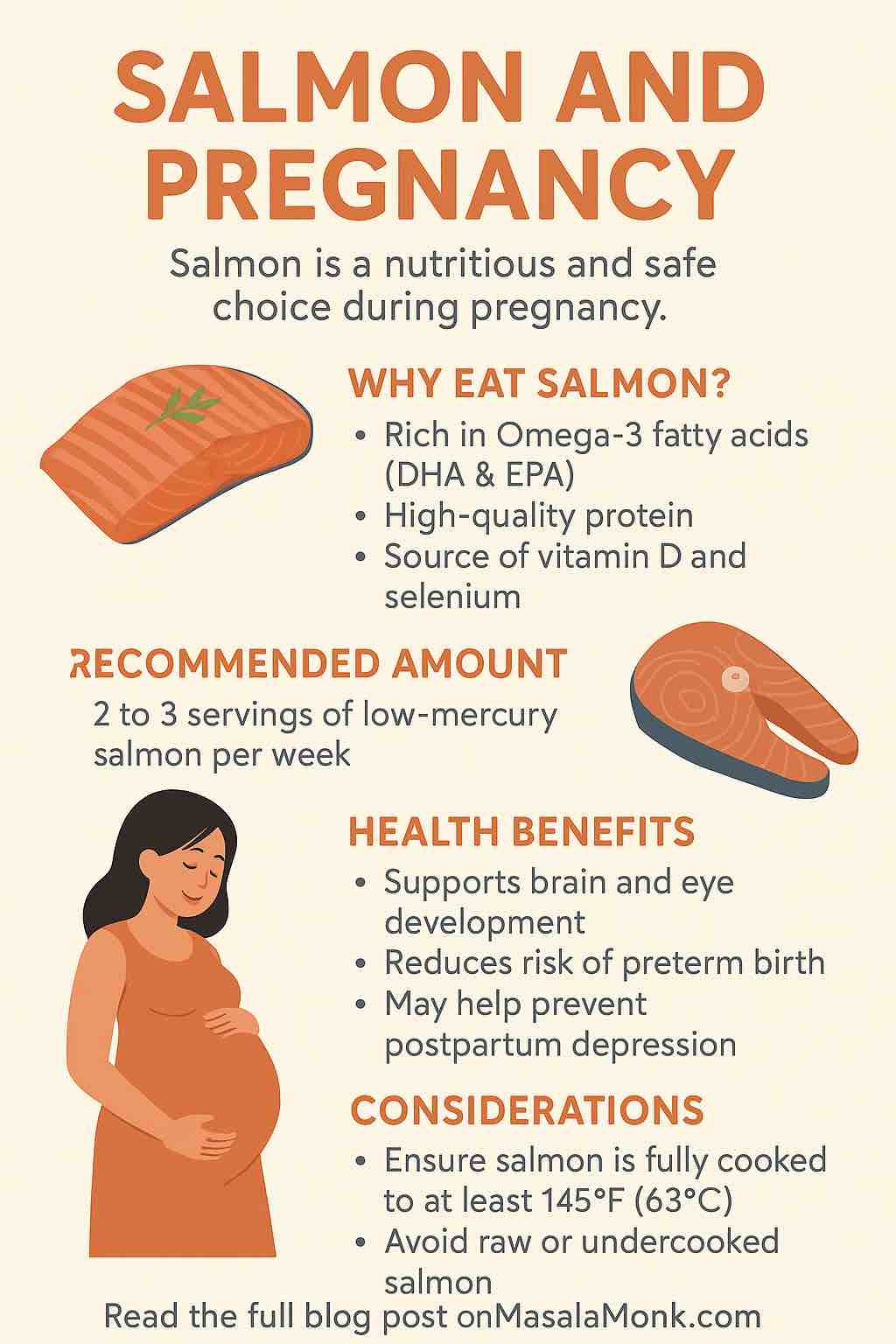
Pregnancy is a remarkable journey of growth, change, and anticipation. Every bite you take plays a critical role in shaping the health and development of your unborn child. Among the myriad foods recommended during pregnancy, salmon shines brightly—not only for its delectable taste but also for its unparalleled nutritional profile that supports maternal health and fetal development.
If you’re wondering whether to include salmon in your pregnancy diet, how much to eat, and how it truly benefits both you and your baby, this comprehensive guide will walk you through everything you need to know.
Why Salmon Is a Nutritional Powerhouse for Pregnancy
Salmon stands out in the sea of seafood due to its impressive combination of essential nutrients. These nutrients are vital for pregnancy because they support both the rapid growth of your baby and the physiological changes your body undergoes.
Omega-3 Fatty Acids: The Building Blocks of Brain and Eye Development
One of the most important nutrients in salmon is omega-3 fatty acids, specifically DHA (docosahexaenoic acid) and EPA (eicosapentaenoic acid). These fats are “essential,” meaning your body can’t produce them in adequate amounts and you must obtain them from your diet.
- Fetal Brain Growth: DHA accumulates in your baby’s brain and retina during pregnancy, particularly in the last trimester when rapid neurological growth occurs. Adequate DHA is associated with better cognitive performance, improved memory, and sharper eyesight in infants.
- Mood and Mental Health: Omega-3s also play a vital role in regulating mood and inflammation. For expecting mothers, sufficient omega-3 intake is linked to reduced risk of prenatal and postpartum depression.
- Inflammation Reduction and Pregnancy Outcomes: EPA and DHA help modulate inflammatory pathways in the body, potentially lowering the risk of complications such as preeclampsia and preterm birth.
High-Quality Protein: Supporting Growth and Repair
Pregnancy increases your body’s protein needs to support:
- The growth of your baby’s tissues and organs.
- Expansion of your uterus, breasts, and blood volume.
- Formation of the placenta.
Salmon delivers lean, easily digestible protein, providing all nine essential amino acids required for these processes. This ensures efficient tissue repair and growth without the excess saturated fat found in some other animal proteins.
Essential Vitamins and Minerals in Salmon
- Vitamin B12: Crucial for red blood cell production and nervous system development. Deficiency can lead to anemia and developmental delays.
- Vitamin B6: Supports metabolism and brain health, helping to reduce pregnancy-related nausea.
- Vitamin D: Promotes calcium absorption for healthy bone formation and immune support.
- Selenium: Acts as an antioxidant protecting cells from oxidative stress, supports thyroid function (critical for fetal brain development), and boosts immunity.
Together, these nutrients create a supportive environment for your baby’s development and your overall pregnancy well-being.
Safety Considerations: How to Enjoy Salmon Safely During Pregnancy
Despite its benefits, many pregnant women hesitate to eat fish due to concerns about contaminants like mercury or bacteria. The good news is that salmon is generally considered safe when properly sourced and cooked.
Mercury and Contaminants: What You Need to Know
- Low Mercury Levels: Unlike larger predatory fish such as swordfish and king mackerel, salmon has relatively low mercury content. This makes it one of the safest fish options during pregnancy.
- Choosing Wild-Caught vs. Farmed Salmon: Both types are acceptable, though wild-caught salmon typically contains higher omega-3 levels. Farmed salmon is carefully regulated in many countries to reduce contaminant risks.
- Potential Pollutants: Some concerns exist about PCBs (polychlorinated biphenyls) and other industrial pollutants, especially in farmed salmon. To minimize risk:
- Choose reputable brands or certifications (like MSC or ASC).
- Limit consumption to recommended amounts.
Cooking and Handling Tips
- Cook Thoroughly: Salmon should be cooked to an internal temperature of 145°F (63°C) to eliminate parasites and bacteria.
- Avoid Raw Preparations: Raw or undercooked salmon, such as sushi or sashimi, may carry risks of infections like listeriosis, which can be dangerous during pregnancy.
- Storage: Refrigerate or freeze salmon promptly after purchase and avoid keeping it beyond its expiration date.
How Much Salmon Should You Eat in Pregnancy?
Striking the right balance is essential: you want to maximize benefits while minimizing risks.
- The U.S. Food and Drug Administration (FDA) and the Environmental Protection Agency (EPA) recommend that pregnant women consume 2 to 3 servings (8 to 12 ounces) of low-mercury fish, such as salmon, per week.
- This amount provides a healthy dose of omega-3s and protein without exceeding safe mercury exposure.
- Keep variety in your diet by including other low-mercury fish options like sardines, trout, and cod.
Culinary Ideas to Make Salmon a Delicious Part of Your Pregnancy Diet
Eating well during pregnancy doesn’t have to be boring. Salmon’s versatility allows it to be incorporated in countless delicious, nutritious dishes:
- Simple Oven-Baked Salmon: Season with herbs, lemon slices, and a drizzle of olive oil for a quick, nutrient-packed meal.
- Salmon Salad Bowl: Flake cooked salmon over a bed of quinoa, kale, avocado, and cherry tomatoes for a fiber-rich, balanced plate.
- Mediterranean Salmon Wrap: Use whole-grain tortillas filled with grilled salmon, tzatziki, cucumber, and fresh spinach.
- Salmon and Sweet Potato Cakes: Mix flaked salmon with mashed sweet potatoes, eggs, and spices, then pan-fry lightly for a comforting meal.
- Asian-Inspired Salmon Stir-Fry: Toss salmon with broccoli, bell peppers, ginger, garlic, and tamari sauce for a quick dinner.
Beyond Nutrition: Environmental and Ethical Considerations
Pregnancy often prompts reflection on broader choices, including the environmental impact of our food.
- Sustainable Seafood: Opt for sustainably sourced salmon to support ocean health and future fish populations.
- Certifications to Look For: MSC (Marine Stewardship Council) for wild salmon and ASC (Aquaculture Stewardship Council) for farmed salmon are trusted labels.
- Local and Seasonal: If possible, purchase local, seasonal salmon to reduce carbon footprint and support community fisheries.
Final Thoughts: Embrace Salmon as a Nourishing Ally in Pregnancy
Choosing salmon during pregnancy offers a wealth of benefits—from promoting your baby’s brain and eye development to supporting your own energy, immunity, and mood. By selecting safe sources, adhering to recommended portion sizes, and preparing salmon thoughtfully, you can confidently enjoy this nutrient-rich fish as part of a balanced, wholesome pregnancy diet.
The journey to motherhood is filled with questions and choices. Let salmon be one of your go-to foods to nourish both you and your baby every step of the way.

10 FAQs About Salmon and Pregnancy
1. Is it safe to eat salmon during pregnancy?
Yes, salmon is safe and highly recommended during pregnancy when consumed in moderation and cooked thoroughly. It’s low in mercury and rich in essential nutrients.
2. How much salmon can pregnant women eat per week?
Pregnant women can safely eat 8 to 12 ounces (2 to 3 servings) of low-mercury fish like salmon each week, as advised by the FDA and EPA.
3. Why is omega-3 fatty acid from salmon important during pregnancy?
Omega-3 fatty acids, especially DHA, support fetal brain and eye development, improve cognitive outcomes, and may reduce risks of preterm birth.
4. Can I eat smoked or raw salmon while pregnant?
Cold-smoked and raw salmon (such as sushi or sashimi) should be avoided during pregnancy due to the risk of infections. Hot-smoked salmon that is fully cooked may be safer but check with your healthcare provider.
5. Does farmed salmon provide the same benefits as wild-caught salmon?
Both farmed and wild-caught salmon provide beneficial omega-3s, protein, and vitamins, though wild salmon typically has higher omega-3 levels. Choose responsibly farmed options with certifications for safety.
6. What nutrients in salmon help reduce pregnancy fatigue?
Salmon contains vitamin B6 and B12, which play a key role in energy metabolism and can help reduce pregnancy-related fatigue.
7. How should I prepare salmon to make it safe for pregnancy?
Cook salmon to an internal temperature of 145°F (63°C) by baking, grilling, steaming, or pan-searing. Avoid raw or undercooked preparations.
8. Can salmon consumption during pregnancy help prevent postpartum depression?
Omega-3s in salmon may help support maternal mental health and reduce the risk of postpartum depression, but should be combined with professional care if symptoms arise.
9. Are there any environmental concerns related to eating salmon during pregnancy?
Choosing sustainably sourced salmon helps protect marine ecosystems and ensures long-term availability of this nutritious fish.
10. What if I don’t like fish or am allergic to salmon?
If you can’t eat salmon, talk to your healthcare provider about omega-3 supplements, particularly those derived from algae, to ensure you get essential fatty acids.









